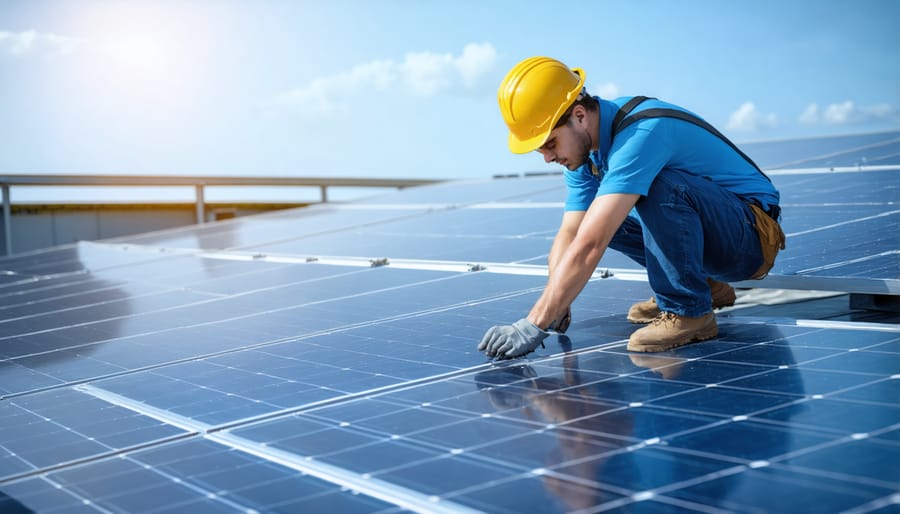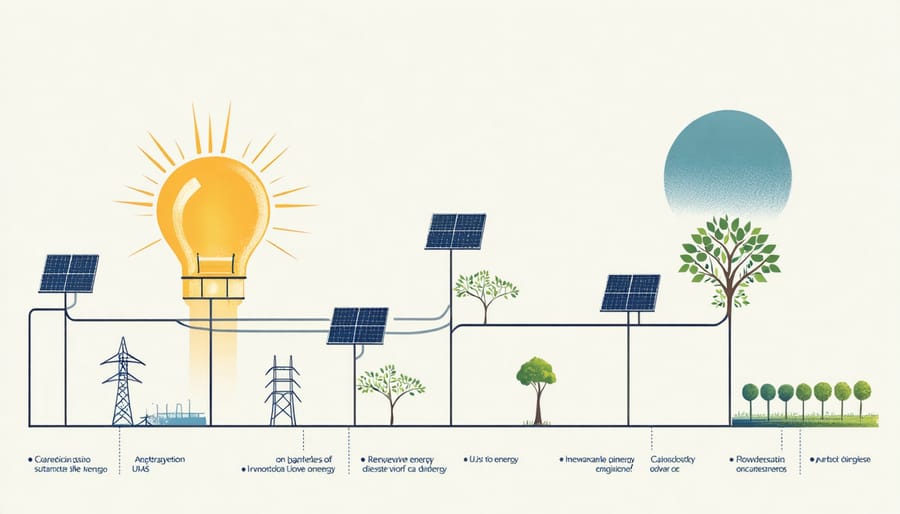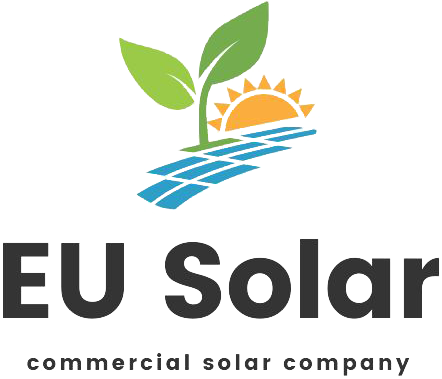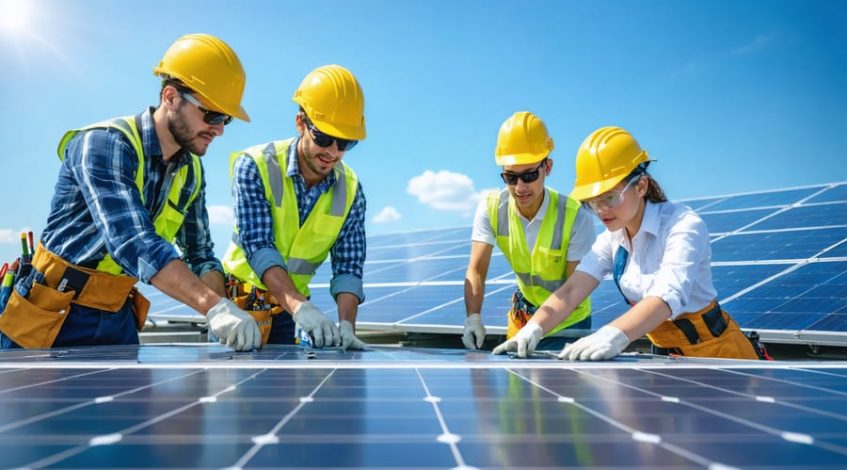Renewable energy technician training has emerged as a critical pathway to growing career opportunities in renewable energy, driven by unprecedented industry expansion and technological advancement. This specialized technical education combines hands-on electrical systems training, advanced diagnostic skills, and comprehensive safety protocols essential for maintaining solar, wind, and other renewable energy installations.
Industry projections indicate a 52% growth in renewable energy technician positions over the next decade, making this career path particularly attractive for skilled trades professionals and technical school graduates. Leading certification programs now offer specialized tracks in solar photovoltaic systems, wind turbine maintenance, and energy storage solutions, providing multiple entry points for aspiring technicians.
The convergence of traditional electrical expertise with cutting-edge renewable technologies has created a unique skill set that commands competitive salaries and offers substantial career advancement opportunities. Modern training programs emphasize practical experience through apprenticeships, simulator-based learning, and real-world project participation, ensuring graduates are fully prepared for immediate deployment in the field.
Core Components of Renewable Energy Technical Training
Technical Fundamentals
Mastering technical fundamentals is crucial for aspiring renewable energy technicians. The foundation begins with understanding basic electrical theory, including DC and AC circuits, voltage, current, and resistance measurements. Technicians must develop proficiency in system design principles, focusing on power distribution, load calculations, and equipment specifications. As the industry evolves, digital skills for renewable energy become increasingly important for system monitoring and diagnostics.
Safety protocols form a critical component of technical training, encompassing electrical safety standards, fall protection, and proper use of personal protective equipment (PPE). Technicians learn to implement lockout/tagout procedures, conduct risk assessments, and follow workplace safety regulations. The curriculum typically includes hands-on training with industry-standard tools and equipment, ensuring practitioners can safely install, maintain, and troubleshoot renewable energy systems.
System integration knowledge is essential, covering the interconnection of various components, proper grounding techniques, and compliance with local electrical codes. Technicians also learn to interpret technical drawings, perform site assessments, and understand energy storage solutions.
Hands-on Installation Training
The hands-on installation training component forms the cornerstone of renewable energy technician preparation, focusing primarily on solar PV system installation and maintenance. Trainees work directly with industry-standard equipment, learning proper mounting techniques, electrical connections, and system optimization procedures in controlled workshop environments.
During practical sessions, technicians gain experience with various solar panel types, inverters, and monitoring systems. They learn to perform site assessments, calculate optimal panel angles, and implement safety protocols while working at heights. The training includes hands-on experience with tools specific to solar installation, such as solar pathfinders, multimeters, and torque wrenches.
Students participate in simulated installations, working in teams to complete full system setups from start to finish. This includes racking assembly, panel mounting, wiring configuration, and inverter installation. Special attention is given to weatherproofing techniques and proper grounding procedures to ensure system longevity and safety compliance.
The practical training culminates in troubleshooting exercises, where technicians learn to diagnose and resolve common system issues, ensuring they’re prepared for real-world challenges in the field.

Professional Certifications and Requirements
Industry-Standard Certifications
Industry certifications play a crucial role in validating the expertise of renewable energy technicians. The North American Board of Certified Energy Practitioners (NABCEP) certification stands as the gold standard in the solar industry, recognized internationally for its rigorous standards and comprehensive evaluation process.
NABCEP offers several certification paths, including the PV Installation Professional Certification, PV Design Specialist Certification, and Solar Heating Installer Certification. These credentials require candidates to demonstrate both theoretical knowledge and practical experience, typically including a minimum of installation hours and documented project participation.
Other valuable certifications include the Electronics Technicians Association (ETA) Renewable Energy Integration certification and the Association of Energy Engineers’ Certified Renewable Energy Professional (REP) credential. These certifications focus on specific aspects of renewable energy systems, from installation and maintenance to system design and energy assessment.
For wind energy technicians, the Global Wind Organisation (GWO) certification is essential, covering safety training and technical competencies. The Building Performance Institute (BPI) certification is valuable for professionals focusing on energy efficiency and building integration of renewable systems.
Most certifications require regular renewal through continuing education credits, ensuring technicians stay current with evolving technologies and industry best practices. Employers increasingly value these credentials as proof of commitment to professional excellence and technical competency.

Regional Requirements
Regional requirements for renewable energy technician certification vary significantly across jurisdictions, with each state or territory maintaining its own specific licensing and regulatory framework. Most regions require technicians to obtain a basic electrical license before specializing in renewable energy systems. This typically involves completing an approved training program and passing a standardized examination.
Many states mandate additional certifications specific to renewable energy technologies. For example, solar PV installers often need NABCEP (North American Board of Certified Energy Practitioners) certification or its regional equivalent. Wind energy technicians may require GWO (Global Wind Organisation) certification, particularly for offshore installations.
Safety compliance is paramount, with OSHA regulations forming the foundation of workplace requirements. Technicians must maintain current certifications in fall protection, electrical safety, and confined space operations. Regular updates to these certifications are mandatory, typically every 2-3 years.
Local building codes and utility interconnection requirements also impact technician qualifications. Many jurisdictions require familiarity with specific codes such as NEC Article 690 for solar PV systems. Some regions have implemented specialized permits and inspections for renewable energy installations, necessitating additional training and documentation.
Technicians should regularly review their local requirements, as regulations evolve with technological advances and industry growth. Professional associations and training providers typically offer updated guidance on regional compliance requirements.
Apprenticeship Programs and Career Pathways
Structured Learning Programs
Structured learning programs, particularly apprenticeships, form the backbone of renewable energy technician training. These programs typically combine hands-on experience with classroom instruction, offering a comprehensive approach to skill development. Traditional apprenticeships span 3-4 years and pair trainees with experienced technicians while providing systematic theoretical education.
The Department of Labor-recognized Renewable Energy Technician Apprenticeship Program offers a standardized curriculum that includes 2,000 hours of on-the-job training and 144 hours of technical instruction annually. Participants gain expertise in solar panel installation, wind turbine maintenance, energy storage systems, and electrical fundamentals while earning a competitive wage.
Industry-specific apprenticeships are also available through major renewable energy companies and utilities. These programs often feature specialized tracks for solar, wind, or hybrid systems, allowing technicians to develop expertise in their preferred field. Benefits include:
– Paid training while learning
– Direct industry connections
– Nationally recognized credentials
– Clear career progression path
– Immediate practical experience
Many apprenticeship programs maintain partnerships with technical schools and community colleges, enabling participants to earn additional certifications or associate degrees simultaneously. This dual-track approach creates well-rounded professionals who understand both theoretical principles and practical applications, meeting the growing demand for qualified renewable energy technicians.

Career Growth Opportunities
Renewable energy technicians can look forward to diverse career advancement opportunities as they gain experience and additional certifications. Many technicians progress to senior roles such as team leader or project manager, overseeing large-scale installations and managing crews. Others specialize in specific technologies, becoming experts in areas like energy storage systems, microgrid integration, or advanced monitoring systems.
Experienced technicians often transition into system design roles, where they can apply their practical knowledge to create more efficient renewable energy solutions. Some pursue positions as technical trainers or consultants, sharing their expertise with the next generation of renewable energy professionals. Quality assurance and inspection roles present another pathway, allowing technicians to leverage their technical knowledge in regulatory compliance and system verification.
The emerging field of hybrid systems creates opportunities for specialists who can work with multiple renewable technologies, including solar, wind, and battery storage. Commercial and industrial sectors particularly value technicians who develop expertise in complex energy management systems and grid integration. With additional business training, technicians can also establish their own renewable energy companies or move into sales engineering roles, where technical expertise combines with business development skills.
Training Success Stories
The renewable energy sector has produced numerous success stories of technicians who have transformed their careers through comprehensive training programs. Sarah Chen, a former automotive technician, completed her renewable energy certification in 2019 and now manages a team of solar installers for a leading commercial energy provider. Within three years, she advanced from entry-level technician to project supervisor, overseeing installations that generate over 5MW of clean energy annually.
James Rodriguez, who transitioned from traditional electrical work, exemplifies how specialized training can accelerate career growth. After completing an intensive 6-month solar technician program and accumulating 2,000 hours of hands-on experience, he established his own renewable energy consulting firm. His company now employs fifteen technicians and specializes in large-scale commercial installations across multiple states.
Another inspiring example is Marcus Thompson, a military veteran who utilized his GI Bill benefits to pursue renewable energy training. Following certification, he secured a position with a major utility company’s wind energy division. His technical expertise and leadership skills, enhanced through specialized training, led to his current role as Operations Manager for offshore wind installations.
Emily Baker’s journey demonstrates the value of continuous learning in this evolving field. Starting as an apprentice solar installer, she pursued additional certifications in energy storage systems and smart grid technology. Today, she works as a technical trainer for a renewable energy academy, helping others achieve their career goals while contributing to the industry’s growth.
These success stories highlight how proper training, combined with dedication and practical experience, can lead to rewarding careers in renewable energy. Each of these professionals started with foundational training and continued to build their expertise through ongoing education and hands-on experience, demonstrating the diverse opportunities available in this growing sector.
Future of Renewable Energy Technical Training
The renewable energy sector is rapidly evolving, driven by emerging technologies and innovative solutions. As the industry advances, technicians must adapt their skillsets to remain competitive and effective. Key technological trends shaping future training requirements include artificial intelligence for predictive maintenance, advanced energy storage systems, and smart grid integration.
Training programs are increasingly incorporating virtual reality (VR) and augmented reality (AR) simulations, allowing technicians to practice complex installations and troubleshooting scenarios in safe, controlled environments. These immersive learning tools are becoming standard components of modern technical education.
Data analytics and digital monitoring systems are becoming crucial elements of renewable energy systems. Future technicians will need proficiency in software applications, remote monitoring tools, and data interpretation to optimize system performance and identify potential issues before they escalate.
The integration of blockchain technology for energy trading and IoT (Internet of Things) devices for system monitoring is creating new specialized roles. Training programs are evolving to include modules on cybersecurity, network management, and digital communication protocols.
As hybrid systems combining multiple renewable sources become more common, technicians will need cross-disciplinary expertise. Future training programs will likely emphasize the interconnection between solar, wind, and energy storage technologies, preparing professionals for increasingly complex integrated systems.
Industry partnerships with educational institutions are expanding to ensure training programs remain aligned with real-world requirements. These collaborations often include hands-on experience with cutting-edge equipment and exposure to actual project scenarios, bridging the gap between theoretical knowledge and practical application.
The path to becoming a renewable energy technician offers exciting opportunities in a rapidly growing industry. As we’ve explored throughout this guide, comprehensive training combines technical education, hands-on experience, and professional certifications to prepare technicians for successful careers in renewable energy.
For those ready to take the next step, begin by researching accredited training programs in your area and reviewing their prerequisites. Consider starting with entry-level certifications while exploring apprenticeship opportunities with established renewable energy companies. Many employers offer on-the-job training programs that can complement formal education.
Remember that continuous learning is essential in this dynamic field. Stay informed about emerging technologies, industry regulations, and advanced certification opportunities. Network with industry professionals, join renewable energy associations, and attend trade shows to build valuable connections and stay current with industry trends.
With the renewable energy sector projected to grow significantly in the coming years, now is an ideal time to invest in your future as a renewable energy technician. The skills you develop will be invaluable in driving the global transition to sustainable energy solutions.

